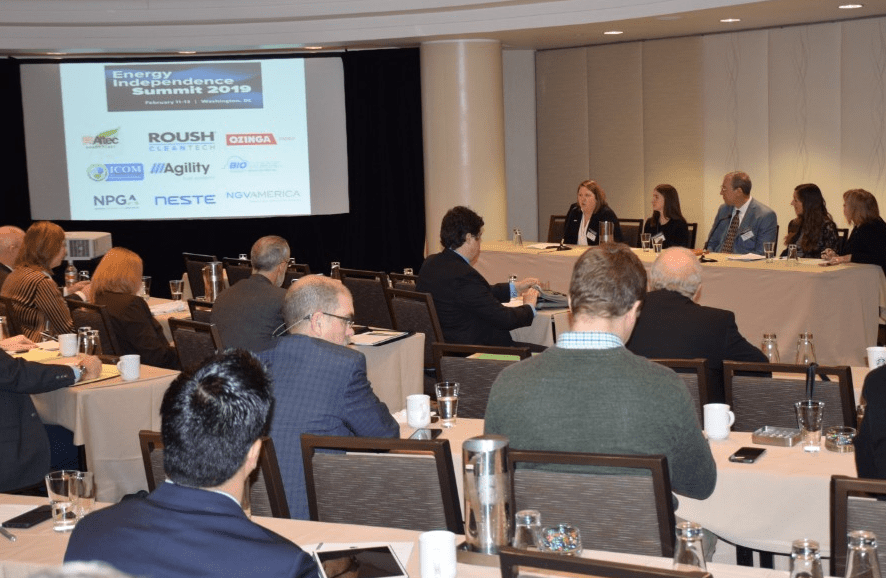On February 11-13, more than 150 clean transportation leaders from across the country descended on Washington, DC for the 13th annual Energy Independence Summit (EIS). The Summit is presented every year by Transportation Energy Partners (TEP), a national organization that brings together Clean Cities coalitions and stakeholders from a diverse array of fleets and clean vehicle and fuel industries. This year, Summit participants included representatives from nearly 40 Clean Cities coalitions across the country.
The primary purpose of the Energy Independence Summit is to educate members of Congress and federal agency leaders about the accomplishments of coalitions and stakeholders at the local and state level. In addition, participants engage members of Congress and staff on specific policies.
The Summit includes the clean transportation industry’s largest and most impactful annual advocacy day. Each year, Summit participants meet with more than 240 House and Senate offices.
The purpose of the Energy Independence Summit is to educate members of Congress and federal agency leaders about the accomplishments of Clean Cities coalitions at local and state levels, engaging Congress and staff on specific policies.
Looking Back on Our Progress
As a result of our work over the years, we have seen funding for the DOE Clean Cities program triple since 2008, despite efforts by the current Administration to eliminate the program. We have worked with Congress to quadruple funding for the EPA Diesel Emissions Reduction Grants over the last five years. For the current fiscal year, the program received $87 million. In addition, we have also joined forces with key industry trade associations to win extensions of critical tax incentives and to preserve the Renewable Fuel Standard (RFS).
Energy Independence Summit 2019 Policy Agenda Goals
This year’s policy agenda included five specific issues:
- Renewal of the expired fuel, vehicle, and infrastructure tax credits to advance markets for the natural gas, propane, biofuels and electric vehicle industries
- Increase funding for the DOE Clean Cities program and USEPA Diesel Emissions Reduction Grants
- Action to get the Federal Highway Administration (FHWA) to certify Buy America compliance and approve CMAQ funding for alternative fuel vehicles assembled in America
- Inclusion of funding for alternative fuels in new infrastructure legislation
- Continuation of the successful federal Renewable Fuel Standard (RFS) in its present form
Clean Fuels Ohio brought enough local members to split into two groups and held meetings with 16 offices.
As a result of our work over the years, we have seen funding for the DOE Clean Cities program triple since 2008, and have quadrupled funding for EPA Diesel Emissions Reduction Grants over the last five years.
Key Takeaways from this Year’s Energy Independence Summit:
As many have heard, Congressional allies tried unsuccessfully to attach “tax extenders”, including several advanced fuel tax credits, to the spending bill that passed a few weeks ago to avoid a government shutdown. Efforts to renew these credits continue, especially in the Senate. Following the Summit, Iowa Senator Chuck Grassley and Oregon Senator Ron Wyden introduced S.167, which would extend the tax incentives through 2019. Prospects are uncertain but it’s important to keep the pressure on. In visits to the Ohio Congressional delegation, we generally heard support from both parties as well as a certain powerlessness to deal with the issue.
Conversations about Clean Cities funding were very positive, but members of the Appropriations committee stressed the importance of hearing from other members if funding is also a priority to them. Now is the time to weigh in on this. Contact your members of Congress and urge them to request an appropriation of $50 million. If you need help, contact your local Clean Cities coalition or Ken Brown from TEP at ken@akbstrategies.com.
Members were generally sympathetic about the CMAQ Buy America situation. However, depending on where the member was from, there was a certain reluctance to waiving rules designed, in theory, to protect American jobs. TEP is encouraging continuation of the process for FHWA to approve CMAQ funding as long as the final assembly of the vehicles takes place in the US.
At least in our meetings with Ohio Congressional members, there was strong support for the RFS. This was not the case in other parts of the country, but there doesn’t seem to be any real appetite right now to dismantle the highly successful policy, especially in the run up to Presidential elections.
Staying Involved & Staying Informed
The 2019 Summit provided another reminder of how much of an impact this event and TEP as an organization make for our industries and coalitions. When we reorganized this event 13 years ago, Clean Cities was not well-known on Capitol Hill. Today, we see recognition and understanding with most of the people we meet with. For those who attended, stay involved. For others, we encourage you to get involved by working with your local Clean Cities coalition and attending EIS 2020 next February 9-12 in Washington, DC.
The 2019 Summit provided another reminder of how much of an impact this event and TEP as an organization make for our industries and coalitions.
TEP would like to thank the following sponsors for supporting this important event:
Platinum Sponsors: UPS, EarthX, and Nissan
Gold Sponsors: VW/Audi, Cummins Westport, United Soybean Board, and REG
Silver Sponsors: ROUSH CleanTech, NGVAmerica, National Biodiesel Board, Ozinga Energy, Altec Green Fleet, National Propane Gas Association, Neste, Agility Fuel Systems, and ICOM Alternative Fuel Systems
Supporting Sponsors: East Bay Clean Cities, Greater New Haven Clean Cities, South Shore Clean Cities, Columbia-Willamette Clean Cities, Utah Clean Cities, and Virginia Clean Cities
More information on the Energy Independence Summit and Transportation Energy Partners can be found at www.transportationenergypartners.org


